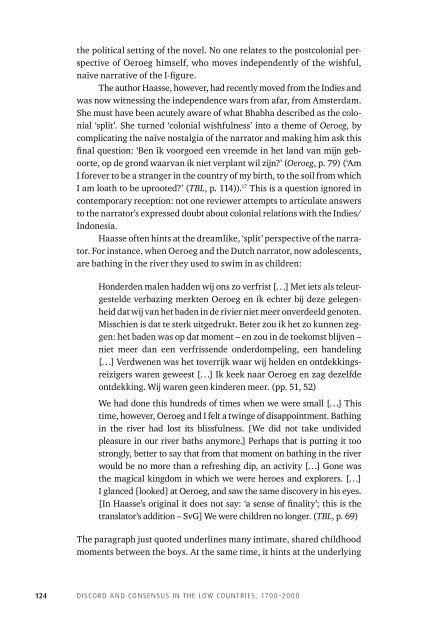Discord Consensus
7aze300jFJo
7aze300jFJo
Create successful ePaper yourself
Turn your PDF publications into a flip-book with our unique Google optimized e-Paper software.
the political setting of the novel. No one relates to the postcolonial perspective<br />
of Oeroeg himself, who moves independently of the wishful,<br />
naïve narrative of the I-figure.<br />
The author Haasse, however, had recently moved from the Indies and<br />
was now witnessing the independence wars from afar, from Amsterdam.<br />
She must have been acutely aware of what Bhabha described as the colonial<br />
‘split’. She turned ‘colonial wishfulness’ into a theme of Oeroeg, by<br />
complicating the naïve nostalgia of the narrator and making him ask this<br />
final question: ‘Ben ik voorgoed een vreemde in het land van mijn geboorte,<br />
op de grond waarvan ik niet verplant wil zijn?’ (Oeroeg, p. 79) (‘Am<br />
I forever to be a stranger in the country of my birth, to the soil from which<br />
I am loath to be uprooted?’ (TBL, p. 114)). 17 This is a question ignored in<br />
contemporary reception: not one reviewer attempts to articulate answers<br />
to the narrator’s expressed doubt about colonial relations with the Indies/<br />
Indonesia.<br />
Haasse often hints at the dreamlike, ‘split’ perspective of the narrator.<br />
For instance, when Oeroeg and the Dutch narrator, now adolescents,<br />
are bathing in the river they used to swim in as children:<br />
Honderden malen hadden wij ons zo verfrist [. ..] Met iets als teleurgestelde<br />
verbazing merkten Oeroeg en ik echter bij deze gelegenheid<br />
dat wij van het baden in de rivier niet meer onverdeeld genoten.<br />
Misschien is dat te sterk uitgedrukt. Beter zou ik het zo kunnen zeggen:<br />
het baden was op dat moment – en zou in de toekomst blijven –<br />
niet meer dan een verfrissende onderdompeling, een handeling<br />
[. ..] Verdwenen was het toverrijk waar wij helden en ontdekkingsreizigers<br />
waren geweest [. ..] Ik keek naar Oeroeg en zag dezelfde<br />
ontdekking. Wij waren geen kinderen meer. (pp. 51, 52)<br />
We had done this hundreds of times when we were small [. ..] This<br />
time, however, Oeroeg and I felt a twinge of disappointment. Bathing<br />
in the river had lost its blissfulness. [We did not take undivided<br />
pleasure in our river baths anymore.] Perhaps that is putting it too<br />
strongly, better to say that from that moment on bathing in the river<br />
would be no more than a refreshing dip, an activity [. ..] Gone was<br />
the magical kingdom in which we were heroes and explorers. [. ..]<br />
I glanced [looked] at Oeroeg, and saw the same discovery in his eyes.<br />
[In Haasse’s original it does not say: ‘a sense of finality’; this is the<br />
translator’s addition – SvG] We were children no longer. (TBL, p. 69)<br />
The paragraph just quoted underlines many intimate, shared childhood<br />
moments between the boys. At the same time, it hints at the underlying<br />
124<br />
DISCORD AND CONSENSUS IN THE LOW COUNTRIES, 1700–2000


